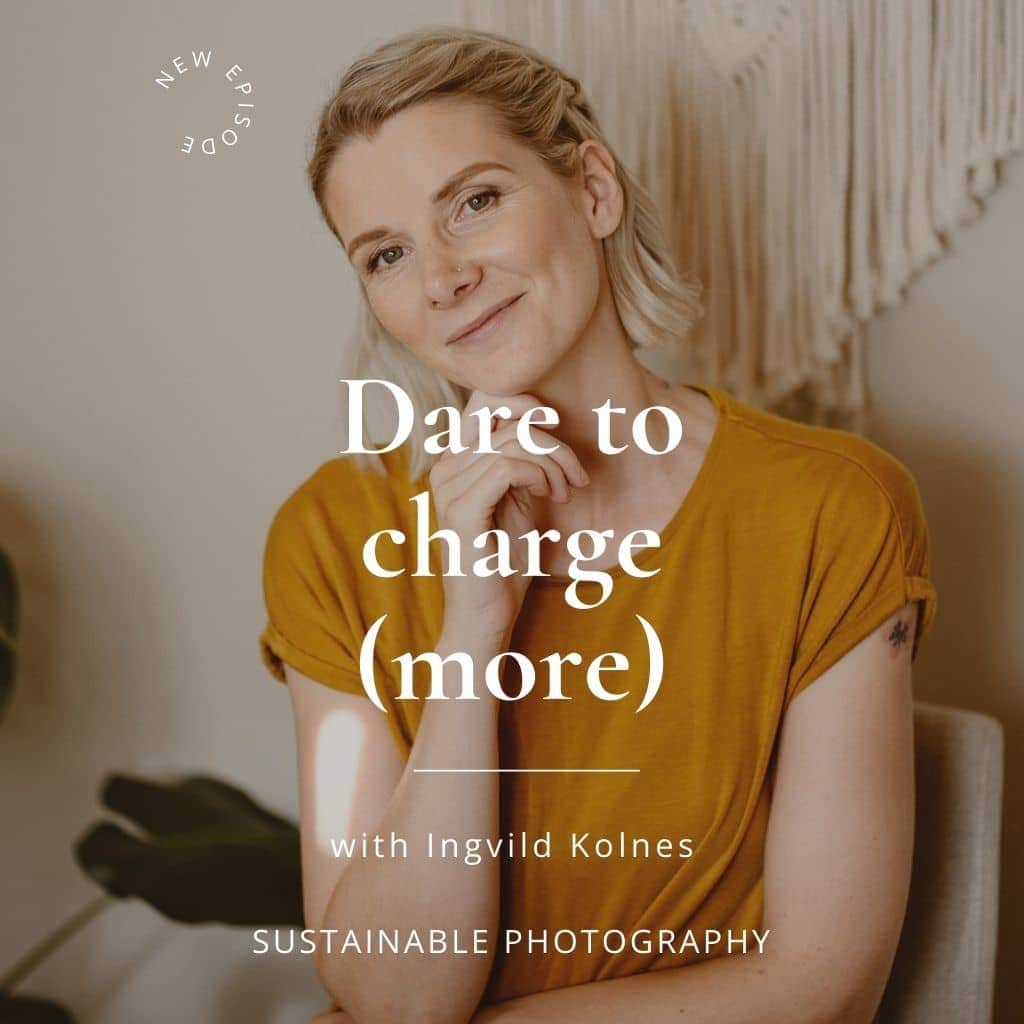Episode Transcript
[00:00:00] We've made it to episode 140 of sustainable photography. That is close to three years of podcasting, and I think that's pretty incredible.
[00:00:12] But that's not what I'm going to talk about today.
[00:00:15] I want to talk about how you can't make everyone happy.
[00:00:20] That should not be your goal.
[00:00:22] But you do have to do what you've promised your clients. At the very least, that should be the bare minimum.
[00:00:32] I make a point of investing in myself and my business constantly. I'm always enrolled in one program or several at a time, learning different things and improving things. Right now I'm doing a full time study in performance psychology and coaching. And of course, the goal is to learn more about the foundations and coaching and all that. But whenever I'm invested in something, there's usually more to learn than what I expect. By that, I mean that there is some kind of thing that you can always pick up on by the way that you're treated, by how communication's done, by how things are laid out. Like, there's so many things to learn. And when it comes to the study, it's an online course study from one of the official universities here in Norway. And it turned out that the lectures all had background music and sound effects throughout. And for me, easily distracted, hard to concentrate, it became impossible to watch it, and even painful to, like, have that annoying kind of like, elevator music on in the background when I was trying to concentrate and really understand what they were saying. So I just reached out to the person responsible for the course, and I asked, how can I turn off the background music? And he replied, that's not possible.
[00:02:07] And I said, okay, but I really can't concentrate. I can't focus on this. With that background music, is it possible to get the videos without it? And then I was told, no, that's going to be impossible. We can't make everyone happy.
[00:02:25] And while I understand that you can't make everyone happy, of course that should never be your goal. Like I already said in the beginning, there are some bare minimums that you should do, and providing content education that people can watch or listen or take in without distractions like that, that should be a bare minimum. And even so, even if that was impossible, which of course, it wasn't, but even if that was impossible, getting a reply like you can't make everyone happy, that doesn't really help me, because I wasn't happy. I'd spent $6,000 enrolling in this course, and I wanted to get something back. And maybe if you're in the US, you're like 6000 for a college level course that sounds like nothing. In Norway, a university and higher education is free. So if you pay for something, then you expect it to be pretty good. Anyway. Regardless of that, there is something to be said about how you treat your customers, how you treat the people around you. But it turned out in the end, just to kind of clarify that it wasn't a big deal. And they have now added audio files of all the lectures without the background music. So it's all good, problem solved, so to speak. But the communication, the replies that I got, they weren't very good. And that leaves me feeling like I'm a difficult person. I'm not wanted in that program. I've had other similar experiences lately. I'm enrolled in a course where there's a schedule available. And when I entered the last meeting, it turned out that there wasn't a meeting.
[00:04:18] Which, you know, is fine. It's a mistake that I'm sure we've all made. I've certainly made it before. But when I told the course guy about it, he said, I can't be bothered to fix it. And it's like. But I set aside time to be there. I expected this to be happening, and I think it's the third or fourth time it's happened with that particular course. And two of the meetings I've tried joining before, they were at like 09:00 a.m. in the morning. And if you know me, you know that it takes a lot for me to get up that early. So when I then get up for no reason, it makes me feel kind of stupid. It makes me feel like I'm being disrespected, that my time is not being respected. And again, I completely understand that everyone makes mistakes, but apologize for it and fix it and, you know, try to make it better. Don't just say that, oh, can't be bothered to update the calendar, then you shouldn't have a calendar. And on that day where that meeting didn't happen, I'm in a different course. Sorry, this makes me sound bit ridiculous, doesn't it? But I'm in a different course where there's a few meetings every week, and I was looking forward to this meeting happening that evening. And then an hour beforehand, it's posted on Facebook, like, really sorry, we've got Wi Fi problems. That meeting is not gonna happen. And I it said, if you need anything, please post here or send us a DM. And that is them taking, not only letting everyone know, but taking responsibility and going above and beyond to try to fix it. And I'm not saying that you have to bend over backwards to make your clients happy, and I'm not saying that you have to or you should even try to make everyone happy because I think that's impossible.
[00:06:15] But what you have to do if you want to have happy clients is to do the bare minimum. You have to provide what is expected of you. So if you tell your clients that they can expect their images within four weeks, don't send them an email after week five or six and say, like, oh, sorry, I was on holiday and I really couldn't be bothered to deliver them on time. That's just not good enough. And even though it's understandable, everyone needs time off. Honestly, your clients just want what they've been promised. So I just think that there's something about that whole thing of paying attention to what you actually promised to deliver and to what you are delivering. And I don't think that that's necessarily something that you automatically or necessarily notice. So I want you to pay attention to what your clients are asking for. If they are asking for things that you feel like are unreasonable, try to dig a little bit deeper and find out why they think that. Why do they think the images are going to get delivered really quickly? Why do they think that they can ask for any kind of photoshop thing and then you just have to do what they say and see? Is there something I can do to clarify this, to make sure that other people don't make the same mistake? Because communication is so important.
[00:07:48] And I think it's one of those things where you will probably always learn and always have to improve.
[00:07:56] I know I do. I always see that there's things not being clear enough and that I have to tweak and just improve things. But if you don't do this, your business will slowly not make it. Because, yes, if you don't want to have the kinds of clients that don't care if meetings are canceled on no notice, then sure, you can think that the easy thing is just to cancel them and not tell anyone. And you know you're going to get rid of the clients who do care, but you're also going to get a bad reputation because the people that experience this, they're going to tell their friends, who are probably going to tell their friends, and then suddenly you're losing out big time.
[00:08:49] And oh, I've got so many examples of this. But let me give you another one. Where I was in this group where I, there was quite a few things that didn't really work very well. And I gave some feedback and I could hear other people giving similar feedback, but the person holding the event was like, no, I just want to do it the way I want to do it. And while that's completely fine, it probably isn't a great business strategy. Because if you want other people's money, then you have to listen to what they want as well. Because when someone gives you feedback, it's because they feel like something is missing or something is unclear or something could be working better. And it's of course, your call to see would this add value? Would this work for me?
[00:09:47] But I strongly recommend that you don't just disregard everything that's coming your way because you think that you know better, because you are not your client. Most times when you are getting criticized, when someone is asking questions or need clarification, it's because the communication is lacking. It's because there's something wrong with the messaging. So it's a really, really, really great way for you to tweak that and just become aware of how you're coming across. Because the way that you're putting it out there, that might not be how it's perceived through the eyes of others. So listen to what your clients say. But again, I just want to really emphasize, you can't make everyone happy. That is not your job. But decide who you want to make happy and figure out what they want from you and then do what you can to make sure that you deliver that. I am curious how you feel about this, though. Do send me a DM on Instagram. You'll find melkolnas and share with me how you feel when you're getting criticized and how you find it to give feedback because it is really important. And if you've ever said anything to me about how you wish something was different, just know that I am constantly thinking about how I can make things better. So don't ever feel like I've forgotten about what you've said, because I definitely haven't. And also, I hope that if you do feel criticized sometimes, just know that it doesn't mean that you're doing anything wrong. And you just need to figure out if it means that you have the wrong clients reaching you or if you have the wrong messaging around it. And definitely don't take it personal. In most instances, criticism is there to help you do things better and not to put you down.
[00:11:44] You just listened to an episode of sustainable photography. Please share this episode with a photographer you care about.


